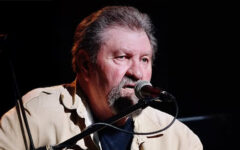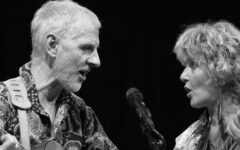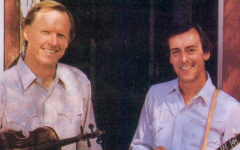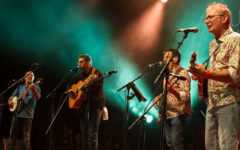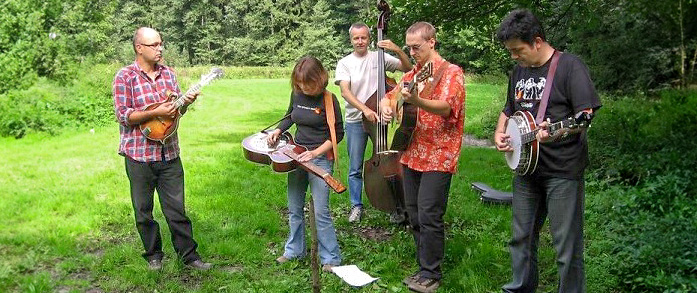
Despite their home far from the Appalachian region, Maňana Band thrive on authenticity. “Our band is from the Czech Republic, which is, I believe, a bluegrass mecca even on a global scale,” says Josef Krenn, the band’s designated leader, singer, and guitarist. “Specifically, we are from several places in Eastern Bohemia, not too far from each other. We usually meet for rehearsals in Jičín, a small town that is conveniently located for all band members, especially for two of us who are originally from there. And it’s no coincidence that not far from Jičín is another small town, Kopidlno, which, in 1970, became the venue for the oldest European bluegrass festival, Banjo Jamboree. The festival was held for the 52nd time this year, albeit in a different location.”
In addition to Krenn, Maňana Band (not to be confused with the Mexican rock band known simply as Mana) features Jaromír Filsak on vocals and banjo; Šárka Rotter, who plays reso-guitar; Pavel Weiser on mandolin and vocals; and Zdeněk Vágner on bass. “We all had experience from other bluegrass bands, and when the time came after the end of a previous band, our bassist and I wanted to start something new. After some time, Maňana Bluegrass Band met for the first time in the lineup that we have been playing in for 18 years. We are still friends, and we still enjoy it. The name of the band references a local wine bar in Jičín called Maňana, where we first met, and which inspired our name.”
The band’s handle also reflects their attitude and approach to a certain extent. “We prefer a traditional sound,” Krenn continued. “Our band’s sound is reflected in our name – Maňana, meaning ‘tomorrow, slowly, no rush.’ Our favorite tempo is moderate, where there is enough time for everything. But we also like to include more lively songs.”
That varied approach Krenn refers to is reflected in by their influences. “Each of us found our way to bluegrass differently, but the roots were similar,” Krenn says. “Country and folk music were, and still are, very popular in our country, even during the time when we were behind the Iron Curtain. Personally, I was most influenced when I first heard the recording of Will the Circle Be Unbroken by the Nitty Gritty Dirt Band. As for musical influences that directly affect our sound, J.D. Crowe is definitely one of them. He was, and still is, an inspiration for our banjo player. We can’t forget Bill Monroe, the Foggy Mountain Boys, and, of course, Seldom Scene, Country Gentlemen, Jim & Jesse, Tony Rice, and the Bluegrass Album Band. But when it comes to all of us, and I dare say all Czech bluegrass and country musicians, we were most influenced by the band Greenhorns, which started in the mid-’60s. They adapted many American songs —what were then called ‘songs of the American West,’ and included many bluegrass classics — with Czech lyrics. By doing so, they popularized them widely in our country.”
That said, Maňana Band has made their own mark, especially in their homeland. “We perform in the Czech Republic at festivals or clubs,” Renn explains. “We also enjoy intimate events where we can have closer contact with the audience. We are most proud of our participation in the oldest European bluegrass festival, Banjo Jamboree. We had the opportunity to play there in 2009 and 2014. But equally important to us are the festivals we enjoy attending as spectators, where we also have the chance to perform. We love the atmosphere of small, almost family-like festivals.”
Happily then, those efforts have paid off. “Our music has been very well received at home,” Renn insists. “The audience appreciates our traditional approach to bluegrass, and our performances often get positive feedback. People value the authenticity of our sound. We also enjoy the fact that our music resonates with a wide range of listeners, from long-time fans of the genre to newer generations who are just discovering this style.”
“We don’t have original songs,” Renn says. “We focus on covers, and we try to choose less frequently played tracks from various American artists, bringing them to audiences who will appreciate and enjoy them.”
Given that approach, Renn is well equipped to offer an opinion on why bluegrass enjoys such international popularity.
“I believe the popularity of bluegrass lies in its storytelling,” he suggests. “It shares the stories of ordinary people, their fates, and everyday concerns that listeners can relate to and understand. Bluegrass is a gentle form of music that doesn’t aim to impress with volume. Instead, it wins over its audience with humility. And last but not least, bluegrass brings standards that almost every musician knows. During a jam session, when musicians from different parts of the world come together, they can play as if they’ve been performing together for years, with little to no rehearsal. That’s truly fascinating. So, without exaggeration, bluegrass brings people together.”

